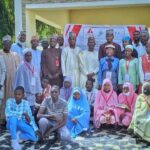Thousands of residents of Maiduguri, the capital of Borno State, and environs who had their own dose of Boko Haram insurgency attacks were killed. More than two million people were also displaced from their ancestral homes and landed in Internally Displaced Persons (IDPs) camps.
But years after the harrowing experiences, lifeline has smiled on some of them, courtesy of federal government intervention as they have been offered permanent homes where they will begin to enjoy a fresh life.
- Banditry: Military operation falters as gunmen choke from lack of fuel, others
- Ronaldo set for Old Trafford homecoming party
At the height of the Boko Haram insurgency, thousands of people in an agrarian village along Dikwa/Ngala highway were displaced when many communities were wiped off by the insurgents.
However, with the provision of the federal government housing units, about 8,000 of the victims who hail from five local government areas of the state have been evacuated from the farm Centre IDP camp to Ngwom town to take possession of the houses.
The project which has brought a new lease of life to the victims is part of the 10,000 housing scheme approved by President Muhammadu Buhari in 2019 under the Special Presidential Intervention in Borno State (SPIB). The mass housing programme was aimed at providing alternative permanent accommodations for IDPs in the state as part of the resettlement initiative.
In line with the programme, the United Nations Development Project (UNDP) also built and handed over about 200 housing units in Ngwom to the Borno State in 2018.
In a chat with Daily Trust Saturday, many of the IDPs who are now landlords expressed satisfaction with their new abode because of its beauty and modern facilities such as solar-powered street light and industrial solar-powered boreholes, schools, market, police station as well as three thousands economic trees.
When they arrived Ngwom town, joy was written all over their faces when they sighted the dazzling housing estates built by the NEDC. While many of them shed tears of joy, others beamed with smiles with interjections that their bitter experiences of sleeping under leaking tents at IDPs camp had ended.

A 70-year-old grandma, Hajiya Zara Lawan, who hails from Lemanti Ward in Mafa Local Government Area of the state, lived in an IDPs camp in Maiduguri for seven years. She expressed delight that the first time she and her family slept in a two-room bungalow allocated to her in Ngwom town, she thought she was already in heaven because she never envisaged such a blissful experience in her lifetime.
She said: “I thought I was already in heaven. I thought I was dreaming, but it was a reality. I lived in a tent for seven years. When we came to Ngwom that night and we were given this place, I kept weeping, but my grandchildren asked me, “grandma, why are you crying?” And I told them that I never knew we could ever come back to my local government again. I thought I was going to end my life in the Maiduguri IDP camp. Now, we are in Mafa. If die, I am fulfilled.
“The joy of sleeping in such a comfortable room and not public place made me wept. I am very happy that I can sleep in a room again despite that this is not my ancestral home. But all the same, I love this place. The joy can not be quantified. I am extremely happy to be back in my local government which I left 7 years ago,” Zara said.
A returnee, Modu Chellube, 55, lauded the federal government for returning them to their local government of origin which he described as laudable projects. He recalled sufferings at displaced camps where they relied on alms from the government and NGOs.
“When you look at the houses, each with courtyard in a cluster arrangement, perimeter fence and ample space for other home activities, you are fulfilled. It is an exotic house for us,” he said.
“I love Ngwon Town and with this kind of accommodation I am having now, my mind is at rest. I have started cultivating my land already. With the little rain left for the year, one can still get something out of it,” he said.
He stressed that resettling people at Ngwon would boost the security of the general area and would also enhance the safety of the highway.
“We are more than 7, 000 people currently occupying this housing unit including women, children and men. Development and economic activities will further boost confidence of motorists plying this highway. At least, we can farm and earn income to feed our families,” Modu said.
Famta Babagana, a widow and mother of four and one of the recipients of the houses, said she had lived in Farm Centre IDP camp for six years.
She recalled how her husband was killed in Ajiri Village in Mafa by Boko Haram insurgents, leaving all the burden of her children’s maintenance. She thanked NEDC for the housing estate for the displaced persons.
“We thank God for this and we appreciate the government for wiping off our tears. We have gone through so many difficult times in our lives. There is no honour or respect in living at IDP camp.
“Now, my family and I can sleep without worries about rainwater leaking into our tents or any fire disaster burning our home. The houses are beautiful and well designed. Now, we can focus on sending our children to schools,” she said.
The Managing Director of NEDC, Mohammed Alkali, said the 1,000 mass housing units consisting of four blocks of 2-bedroom bungalows with veranda and courtyard in a cluster arrangement were built.
He said the commission was committed to its core mandate to develop the region in both human and development across the six states of the region.
According to him, about N2 billion was expended by the board to construct the houses, equip schools as well as the establishment of technical and vocational centres around the region.

 Join Daily Trust WhatsApp Community For Quick Access To News and Happenings Around You.
Join Daily Trust WhatsApp Community For Quick Access To News and Happenings Around You.


